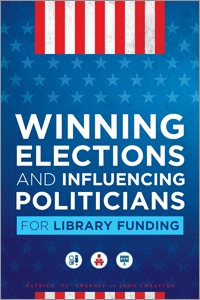Primary tabs
You don't need to be an ALA Member to purchase from the ALA Store, but you'll be asked to create an online account/profile during checkout to proceed. This Web Account is for both Members and non-Members. Note that your ALA Member discount will be applied at the final step of the checkout process.
If you are Tax-Exempt, please verify that your account is currently set up as exempt before placing your order, as our new fulfillment center will need current documentation. Learn how to verify here.
- Description
- Table of Contents
- About the authors
- Reviews
Buy as part of the Library Funding Bundle and save!
As the saying goes, all politics is local. And 90% of funding for public libraries comes from the will of local politicians and, in turn, from local voters. So it's urgent that librarians, library supporters, and anyone interested in running an election or campaign for a library understand the strategies, resources, and tactics necessary for positive political action. Whether election day is four months away or four years away, there are immediate steps library leaders and local library ballot committees should take to help secure a successful ballot initiative later. Written by two experienced library campaigners, this action-driven manual for anyone running a political campaign for libraries dives into
- proven successful campaigning techniques for rural, suburban, and urban settings;
- expert analysis on how political perceptions are formed, how political power works, and ways libraries can reach funding or political goals;
- starting the discussion internally;
- the right approach to setting up the committee structure, and identifying the core leadership team for the committee;
- tips on networking, cultivating good relationships with the power players in the community, and building a winning coalition;
- canvassing and direct voter contact;
- responding effectively to opposition, including voters who habitually resist taxes or library funding increases;
- the differences between paid media and earned media; and
- best practices for marketing and message development, fundraising, volunteer engagement, and other key areas.
Filled with easy to follow strategies, this book will guide ballot committees, librarians, trustees, and library advocates through the process of winning an election for funding their library. LIS students will also benefit from the early exposure to political literacy skills provided by this book.
Foreword, by Rebekkah Smith Aldrich
Acknowledgments
Introduction
Chapter 1 Getting Started
Chapter 2 Surfacing
Chapter 3 Schmoozing and Networking
Chapter 4 Early Work and Political Landscape Memo
Chapter 5 Power Mapping
Chapter 6 Building Your Vote Yes Committee
Chapter 7 Committee Roles and Responsibilities
Chapter 8 Getting on the Ballot
Chapter 9 Campaign Budget
Chapter 10 Fund-Raising
Chapter 11 Volunteers
Chapter 12 Theme and Message
Chapter 13 Responding to Opposition
Chapter 14 Earned Media
Chapter 15 Paid Media
Chapter 16 Voter Data
Chapter 17 Polling
Chapter 18 Website and Digital Platforms
Chapter 19 Canvassing and Phone Banking
Chapter 20 Campaign Events
Chapter 21 E-Mail
Chapter 22 Facebook
Conclusion
About the Authors
Index
Patrick “PC” Sweeney
Patrick “PC” Sweeney is a tireless and innovative advocate for libraries and the current political director for EveryLibrary. A 2007 graduate of the San Jose School of Library and Information Sciences, he is a former administrative librarian of the Sunnyvale (California) Public Library and was executive director of EveryLibrary California, a statewide ballot committee to support library ballot propositions. He is active in the California Library Association and across library social media as a cofounder of the ALA Think Tank. His library blog is well respected, and he is a sought-after speaker and presenter. A recent project, the Story Sailboat, worked to provide library services and materials—by boat—in the San Francisco Bay area. He was named a 2015 Mover & Shaker by Library Journal and tweets at @pcsweeney.
John Chrastka
John Chrastka is EveryLibrary's founder and is a longtime library trustee, supporter, and advocate. He is a former partner in AssociaDirect, a Chicago-based consultancy focused on supporting associations in membership recruitment, conference, and governance activities. He is a former president and member of the Board of Trustees for the Berwyn (Illinois) Public Library (2006–2015) and is a former president of the Reaching Across Illinois Libraries System (RAILS) multi-type library system. Prior to his work at AssociaDirect, he was director for membership development at the American Library Association. He is a member of the ALA as well as the Illinois Library Association and the American Political Sciences Association. He was named a 2014 Mover & Shaker by Library Journal and tweets @mrchrastka.
"If you work in a public library in the U.S., buy this book, read it thoroughly, and use everything it teaches you throughout your library career ... Your budget could depend in it."
— MarketingLibraryServices.com
"The authors do a masterful job of laying out the challenges library advocates can expect, while energizing readers all the while ... Sweeney and Chrastka deserve credit for a very up-to-date approach. The book includes discussion about the recent election of President Donald Trump and notes an increased potential for anti-library rhetoric, devoting a chapter to how best to respond to opponents, even opponents who lie. The authors have turned what can seem daunting and insurmountable into something very possible and approachable. Best of all, it feels like the authors are walking hand in hand with readers and will be with them every step along the way."
— VOYA
" The emphasis of this book is on best practices to help the reader through this difficult yet effective way of gaining and maintaining library funding through political action. Highly recommended for public libraries and any library that receives partial or full public funding."
— Catholic Library World



